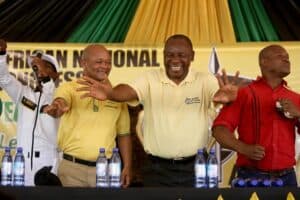Musk ‘should not operate in SA without adhering to laws’.

The portfolio committee on communications and digital technologies has summoned Minister Solly Malatsi to brief parliament on the newly issued policy directives aimed at easing broad-based black economic empowerment (B-BBEE) requirements for licensing satellite services, including Elon Musk’s Starlink.
Malatsi has gazetted a policy directive on the role of equity equivalent investment programmes (EEIPs) in the information and communication technology (ICT) sector – a mechanism he said would accelerate broadband access, recognising alternatives to a 30% B-BBEE ownership legal compliance.
ALSO READ: Malatsi summoned to Parliament to explain Starlink policy directive
Starlink the world’s first
Starlink is the world’s first and largest satellite constellation, using a low earth orbit to deliver broadband internet, capable of supporting streaming online gaming and video calls – and the company which is a wholly owned subsidiary of Musk’s aerospace company SpaceX.
While the Institute of Race Relations has lauded Malatsi’s decision to direct the Independent Communications Authority of South Africa (Icasa) to “urgently consider” regulatory changes in the telecoms sector as “a step towards shifting South Africa to a pro-growth footing”, political economists have warned of repercussions in ditching B-BBEE requirements.
Political economist Sam Koma said there was a coincidence between the release of this policy direction and businessman Johann Rupert’s remarks made during last week’s visit to the White House by the SA delegation.
“It is incumbent upon the minister to assure the public that his policy direction is not tailored to suit the demands made by Starlink in seeking exemptions from the 30% B-BBEE ownership.”
MPs to weigh in
Malatsi said the proposals had been some time in the making and had nothing to do with the White House visit.
“It’s also up to the MPs to weigh up the policy options made by the minister and decide which option will best serve the public interest,” said Koma.
He said a careful reading of Malatsi’s policy direction on EEIPs in the ICT sector made it “clear what the gazetted policy seeks to provide – consistency in the ICT in as far as the participation of multi-national companies is concerned and the application of B-BBEE”.
ALSO READ: Starlink gets 10-year satellite internet licence in Lesotho
“As things stand, the current policy practice requires the acquisition of a licence to be based on the 30% shares to be in the hands of historically disadvantaged individuals,” said Koma.
American companies in SA
Independent political analyst Sandile Swana said there were 22 American companies with a presence in South Africa, which included Microsoft, Amazon and Ford, having invested over several years in the country.
“American firms have, over the years, complied with B-BBEE laws in South Africa. There is a law in our country, the Electronic Communications Act, governing the telecoms sector, which established and continues to govern Icasa,” said Swana.
“The law states clearly that there must be B-BBEE shareholding in any licence. Existing telecoms companies – whether Vodacom or MTN – are forced to have black shareholders.
“Should it wish to invest in South Africa, Elon Musk’s Starlink will be forced to operate under Icasa governance rules.”
EEIPs
However, according to Mteto Nayti, the former MD of Microsoft SA, who now chairs BSG, the idea of EEIPS has been implemented previously.
In a post on X yesterday, Mteto wrote: “I signed one of the first equity equivalent deals in the ICT sector worth about R500 million. The equity equivalent deal paved the way for more than R25 billion that Microsoft has invested in SA under the leadership of Lillian Barnard.
“The R25 billion direct investment by Microsoft was about building cloud data centres in SA. In the process, creating youth employment and buying materials from local businesses. It was never about dishing that money to individuals.”
Julius Malema’s view
EFF leader Julius Malema said Starlink should not be allowed to operate in South Africa without adhering to B-BBEE laws.
“[Government] wants to relax B-BBEE laws for Musk to operate in South Africa. There is not such a law in our country,” he told supporters in the Free State.
The African Transformation Movement condemned what it called “the ANC-DA coalition’s latest act of betrayal against the people of South Africa”.
The party said Malatsi’s idea was “a shameless sellout to American oligarchs Musk and US President Donald Trump – a move that spits in the face of our nation’s transformation agenda”.
NOW READ: WATCH: Starlink not debated with Trump, Ramaphosa says






